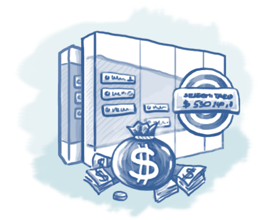In recent articles, we’ve devoted much discussion to ROI (return on investment) with regard to CRM solutions ROI.
CRM has a very intimate relationship with the success of not only a sales force but a whole company—hence it is well worth a considerable investment of time to figure out what a CRM application needs to look like in order to rapidly and adequately pay for itself.
With a startup, CRM ROI might not seem to be the most important issue to address. Selling product and obtaining clients may appear to be the one and only mandate. But in actuality there is no more crucial time to conclusively figure out CRM Solution ROI than right at the beginning of the life of a business.
 Skimping on the CRM Solution
Skimping on the CRM Solution
A startup is often beginning its life on a shoestring budget. Hence any software solution purchased will often be the least expensive available, offering the very basic tools for functionality. Depending on the application, these “cheap and basic” solutions may work enough to get the company moving. For example, a basic word processing program might be sufficient; it can be later replaced with more advanced functionality with little to no interruption of company operations.
But a CRM solution is an entirely different matter. It is the key tool for conducting business by your sales force and sales management and allows the sales department to function at top efficiency. The more rapidly and easily sales data can be stored and retrieved, the faster and more agile sales are going to be made. With the right CRM Software your sales force is empowered and in a much stronger position to achieve the quotas so desperately important at startup and beyond.
What happens if you start into business with an inadequate CRM application?
First, as noted above, your sales velocity will be slower—the last thing you need when you’re trying to get off the ground as a business. But more importantly you’re going to want to analyze your sales as you go; you’ll want to know which product lines are selling the best and to which target companies. You’ll need to be able to look at overall sales trends for the company, for individual reps, and for territories. You’ll want to have accurate sales forecasts based on precise data—data that won’t be available from an inadequate CRM application.
Balancing Cost with Functionality
Yes, you’re still a startup with limited funds. So how can you obtain the best possible CRM solution without blowing your whole software budget in one go?
The answer is the same as we’ve been saying all along: start by determining exactly what your company will need in a CRM solution. Interview every relevant person and department and discover how and why they’ll be interacting with CRM. This information, assembled and summarized, will clearly show you what your CRM solution should look like.
Surprisingly, you’ll probably discover that the needed CRM solution isn’t a highly complex affair with all the “bells and whistles.” You have certain required functionality, and perhaps will need additional features as time goes on.
The idea then is to find a CRM solution that comes as close as possible to the one clarified through your research—which at the same time can be obtained with the money your company has to spend. It might cost a bit more than you originally allocated—but the time and money saved up the line (in simpler terms, CRM Solution ROI) will be quite substantial.
Your CRM solution will stay with you as you grow, and if you have implemented the right one to begin with it will be very instrumental in that growth. The time to figure out your best possible CRM solution is at startup—to give your company every possible advantage in becoming a huge success.
To learn more about how a CRM solution can help you smoothly grow your sales, sign up for one of our free webinars. Get your free trial of Pipeliner CRM now.



















